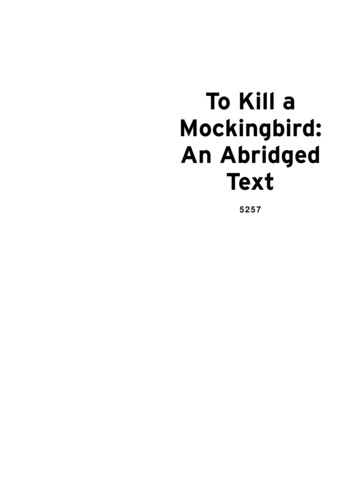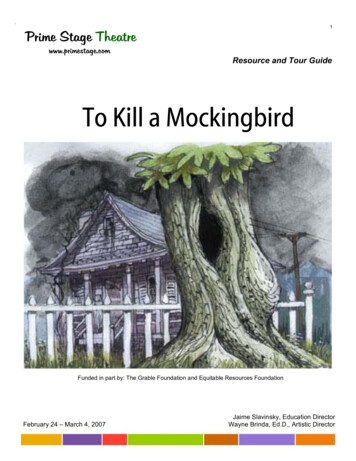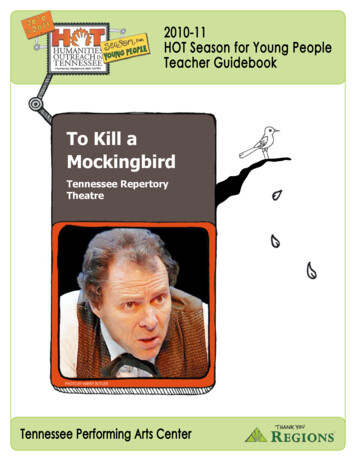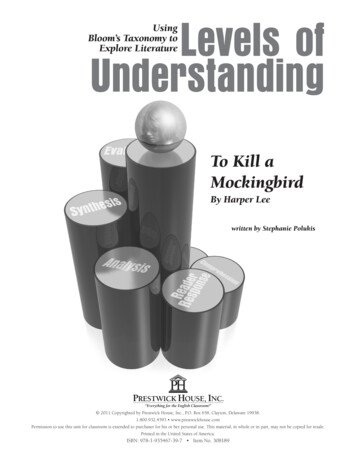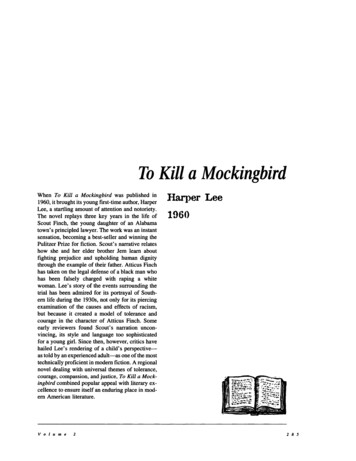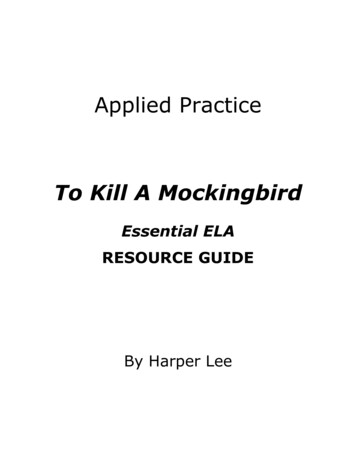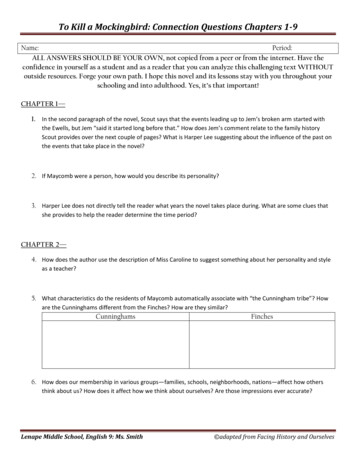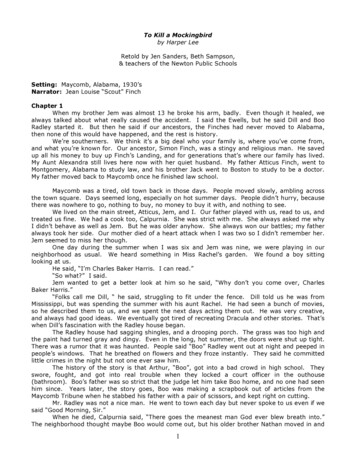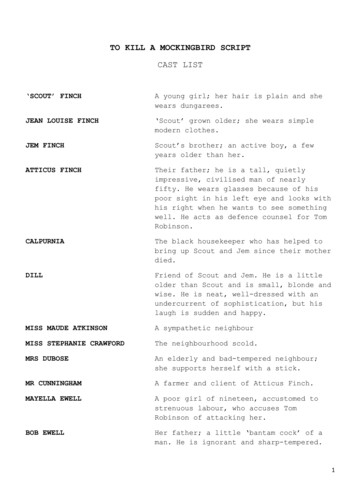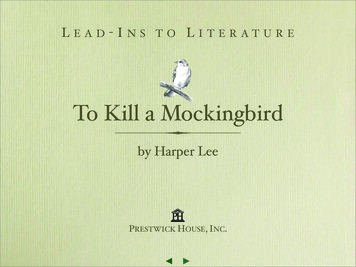![To Kill A Mockingbird [cs] - Summer Reading 2017](/img/29/to-kill-a-mockingbird.jpg)
Transcription
TOKillAMOCKINGBIRDBy HARPER LEEm RBOOKSA Trme Warner Company
If you purchase this book without a cover you should beaware that this book may have been stolen property andreported as .unsold and destroyed" to the publisher. In suchcase neither the author nor the publisher has received anypayment for this ''stripped book."WARNER BOOKS EDITIONCopyright I 960 by Harper LeeAll rights reserved.Published by arrangement with J. B. Lippincott Company,Subsidiary of Harper & Row Publishers, Inc., East WashingtonSquare, Philadelphia, Pennsylvania 19105.Warner Books, Inc.1271 Avenue of the AmericasNew York, N.Y. 10020Visit our Web site atwww . wamerbooks.com0 A Time Warner CompanyPrinted in the United States of AmericaFirst Warner Books Printing: December, 198255ATIENI'ION: SCHOOlS AND CORPORATIONSWARNER books are available at quantity discountswith bulk purchase for educational, business, orsales promotional use. For information, pleasewrite to: SPECIAL SALES DEPARTMENT, WARNERBOOKS, 1271 AVENUE OF THE AMERICAS, NEWYORK, N.Y. 10020
Dedicationfor Mr. Lee and Alicein consideration of Love &. Affection
Lawyers, I suppose, were children once.CHARLES LAMB
4Q.4Q.Part One
1When he was nearly thirteen, my brother Jem got his armbadly broken at the elbow. When it healed, and Jem's fearsof never being able to play football were assuaged, he wasseldom self-conscious about his injury. His left arm wassomewhat shorter than his right; when he stood or walked,the back of his hand was at right angles to his body, his thumbparallel to his thigh. He couldn't have cared less, so long ashe could pass and punt.When enough years had gone by to enable us to look backon them, we sometimes discussed the events leading to hisaccident. I maintain that the Ewells started it all, but Jem,who was four years my senior, said it started long beforethat. He said it began the summer Dill came to us, when Dillfirst gave us the idea of making Boo Radley come out.I said if he wanted to take a broad view of the thing, itreally began with Andrew Jackson. If General Jackson hadn'trun the Creeks up the creek, Simon Finch would never havepaddled up the Alabama, and where would we be if he hadn't?We were far too old to settle an argument with a fist-fight,so we consulted Atticus. Our father said we were both right.Being Southerners, it was a source of shame to some mem bers of the family that we had no recorded ancestors on eitherside of the Battle of Hastings. All we had was Simon Fine ,a fur-trapping apothecary from Cornwall whose piety wasexceeded only by his stinginess. In England, Simon wasirritated by the persecution of those who called themselvesMethodists at the hands of their more liberal brethren, and-3
4IHARPER Lr:r:as Simon called himself a Methodist, he worked his wayacross the Atlantic to Philadelphia, thence to Jamaica, thenceto Mobile, and up the Saint Stephens. Mindful of John Wes ley 's strictures on the use of many words in buying andselling, Simon made a pile practicing medicine, but in thispursuit he was unhappy lest he be tempted into doing whathe knew was not for the glory of God, as the putting on ofgold and costly apparel . So Simon, having forgotten his teach er's dictum on the possession of human chattels, bought threeslaves and with their aid established a homestead on the banksof the Alabama River some forty miles above Saint Stephens.He returned to Saint Stephens only once, to find a wife, andwith her established a line that ran high to daughters. Simonlived to an impressive age and died rich.It was customary for the men in the family to remain onSimon's homestead, Finch's Landing, and make their livingfrom cotton. The place was self-sufficient: modest in com parison with the empires around it, the Landing neverthelessproduced everything required to sustain life except ice, wheatflour, and articles of clothing, supplied by river-boats fromMobile.Simon would have regarded with impotent fury the dis turbance between the North and the South, as it left his de scendants stripped of everything but their land, yet thetradition of living on the land remained unbroken until wellinto the twentieth century, when my father, Atticus Finch,went to Montgomery to read law, and his younger brotherwent to Boston to study medicine. Their sister Alexandra wasthe Finch who remained at the Landing: she married a taciturnman who spent most of his time lying in a hammock by theriver wondering if his trot-lines were full.When my father was admitted to the bar, he returned toMaycomb and began his practice. Maycomb, some twentymiles east of Finch' s Landing, was the county seat of May comb County. Atticus's office in the courthouse containedlittle more than a hat rack, a spittoon, a checkerboard and anunsullied Code of Alabama. His first two clients were thelast two persons hanged in the Maycomb County jail. Atticushad urged them to accept the state's generosity in allowingthem to plead Guilty to second-degree murder and escape
To KILL A MOCKINGBIRD I 5with their lives, but they were Haverfords, in MaycombCounty a name synonymous with jackass. The Haverfordshad dispatched Maycomb's leading blacksmith in a misun derstanding arising from the alleged wrongful detention of amare, were imprudent enough to do it in the presence of threewitnesses, and insisted that the-son-of-a-bitch-had-it-coming to-him was a good enough defense for anybody. They per sisted in pleading Not Guilty to first-degree murder, so therewas nothing much Atticus could do for his clients except bepresent at their departure, an occasion that was probably thebeginning of my father's profound distaste for the practiceof criminal law.During his first five years in Maycomb, Atticus practicedeconomy more than anything; for several years thereafter heinvested his earnings in his brother's education. John HaleFinch was ten years younger than my father, and chose tostudy medicine at a time when cotton was not worth growing;but after getting Uncle Jack started, Atticus derived a rea sonable income from the law. He liked Maycomb, he wasMaycomb County born and bred; he knew his people, theyknew him, and because of Simon Finch's industry, Atticuswas related by blood or marriage to nearly every family inthe town.Maycomb was an old town, but it was a tired old townwhen I first knew it. In rainy weather the streets turned tored slop; grass grew on the sidewalks, the courthouse saggedin the square. Somehow, it was hotter then: a black dogsuffered on a summer's day; bony mules hitched to Hoovercarts flicked flies in the sweltering shade of the live oaks onthe square. Men's stiff collars wilted by nine in the morning.Ladies bathed before noon, after their three-o'clock naps, andby nightfall were like soft teacakes with frostings of sweatand sweet talcum.People moved slowly then. They ambled across the square,shuffled in and out of the stores around it, took their timeabout everything. A day was twenty-four hours long butseemed longer. There was no hurry, for there was nowhereto go, nothing to buy and no money to buy it with, nothing·to see outside the boundaries of Maycomb County. But it
6I R L was a time of vague optimism for some of the people: May comb County had recently been told that it had nothing tofear but fear itself.We lived on the main residential street in town-Atticus,Jem and I, plus Calpumia our cook. Jem and I found ourfather satisfactory: he played with us, read to us, and treatedus with courteous detachment.Calpumia was something else again. She was all anglesand bones; she was nearsighted; she squinted; her hand waswide as a bed slat and twice as hard. She was always orderingme out of the kitchen, asking me why I couldn't behave aswell as Jem when she knew he was older, and calJing mehome when I wasn't ready to come. Our battles were epicand one-sided. Calpurnia always won, mainly because Atticusalways took her side. She had been with us ever since Jemwas born, and I had felt her tyrannical presence as long as Icould remember.Our mother died when I was two, so I never felt her ab sence. She was a Graham from Montgomery; Atticus met herwhen he was first elected to the state legislature. He wasmiddle-aged then, she was fifteen years his junior. Jem wasthe product of their first year of marriage; four years later Iwas born, and two years later our mother died from a suddenheart attack. They said it ran in her family. I did not missher, but I think Jem did. He remembered her clearly, andsometimes in the middle of a game he would sigh at length,then go off and play by himself behind the car-house. Whenhe was like that, I knew better than to bother him.When I was almost six and Jem was nearly ten, our sum mertime boundaries (within calling distance of Calpurnia)were Mrs. Henry Lafayette Dubose's house two doors to thenorth of us, and the Radley Place three doors to the south.We were never tempted to break them. The Radley Place wasinhabited by an unknown entity the mere description of whomwas enough to make us behave for days on end; Mrs. Dubosewas plain hell .That was the summer Dill came to us.Early one morning as we were beginning our day's playin the back yard, Jem and I heard something next door inMiss Rachel Haverford's collard patch . We went to the wirefence to see if there was a puppy-Miss Rachel 's rat terrier
To KILL A MOCKINGBIRD/7was expecting-instead we found someone sitting looking atus. Sitting down, he wasn 't much higher than the collards.We stared at him until he spoke:" Hey . "uHey yourself, " said Jem pleasantly."I'm Charles Baker Harris, " he said . "I can read. ""So what?" I said."I just thought you'd like to know I can read. You gotanything needs readin' I can do it. . . ". How old are you , " asked Jem, "four-and-a-half?".Goin' on seven. ". .Shoot no wonder, then, " said Jem, jerking his thumb atme. "Scout yonder's been readin' ever since she was born,and she ain't even started to school yet. You look right punyfor goin' on seven. "" I ' m little but I'm old," he said.Jem brushed his hair back to get a better look. "Why don' tyou come over, Charles Baker Harris?" he said. "Lord, whata name . ' '" ' s not any funnier'n yours. Aunt Rachel says yourname' s Jeremy Atticus Finch. "Jem scowled. " I ' m big enough to fi t mine, " h e said."Your name's longer'n you are. Bet it's a foot longer.""Folks call me Dill," said Dill, struggling under the fence." Do better if you go over it instead of under it, " I said."Where'd you come from?"Dill was from Meridian, Mississippi, was spending thesummer with his aunt, Miss Rachel, and would be spendingevery summer in Maycomb from now on. His family wasfrom Maycomb County originally, his mother worked for aphotographer in Meridian, had entered his picture in a Beau tiful Child contest and won five dollars. She gave the moneyto Dill, who went to the picture show twenty times on it."Don't have any picture shows here, except Jesus ones inthe courthouse sometimes, " said Jem. "Ever see anythinggood?''Dill had seen Dracula, a revelation that moved Jem to eyehim with the beginning of respect. ' 'Tell it to us, '' he said.Dill was a curiosity. He wore blue linen shorts that buttonedto his shirt, his hair was snow white and stuck to his headlike duckftuff; he was a year my senior but I towered over.
8ItiARPf:R Ler;him. As he told us the old tale his blue eyes would lightenand darken; his laugh was sudden and happy; he habituallypulled at a cowlick in the center of his forehead.When Dill reduced Dracula to dust, and Jem said the showsounded better than the book, I asked Dill where his fatherwas: '"You ain't said anything about him." I haven't got one . "'"Is he dead?""No . . . ""Then if he's not dead you've got one, haven't you?"Dill blushed and Jem told me to hush, a sure sign that Dillhad been studied and found acceptable. Thereafter the sum mer passed in routine contentment. Routine contentment was:improving our treehouse that rested between giant twin china berry trees in the back yard, fussing, running through our listof dramas based on the works of Oliver Optic, Victor Ap pleton, and Edgar Rice Burroughs. In this matter we werelucky to have Dill. He played the character parts formerlythrust upon me-the ape in Tarzan, Mr. Crabtree in TheRover Boys, Mr. Damon in Tom Swift. Thus we came toknow Dill as a pocket Merlin, whose head teemed with ec centric plans, strange longings, and quaint fancies.But by the end of August our repertoire was vapid fromcountless reproductions. and it was then that Dill gave us theidea of making Boo Radley come out.The Radley Place fascinated Dill. In spite of our warningsand explanations it drew him as the moon draws water, butdrew him no nearer than the light-pole on the corner, a safedistance from the Radley gate. There he would stand, his armaround the fat pole, staring and wondering.The Radley Place jutted into a sharp curve beyond ourhouse. Walking south , one faced its porch; the sidewalkturned and ran beside the lot. The house was low, was oncewhite with a deep front porch and green shutters, but hadlong ago darkened to the color of the slate-gray yard aroundit. Rain-rotted shingles drooped over the eaves of the veranda;oak trees kept the sun away. The remains of a picket drunk enly guarded the front yard-a "swept" yard that was neverswept-where johnson grass and rabbit-tobacco grew inabundance.Inside the house lived a malevolent phantom. People said
To KILL A MOCKINGBIRD / 9he existed, but Jem and I had never seen him . People saidhe went out at night when the moon was down, and peepedin windows. When people' s azaleas froze in a cold snap, itwas because he had breathed on them. Any stealthy smallcrimes committed in Maycomb were his work. Once the townwas terrorized by a series of morbid nocturnal events: people' schickens and household pets were found mutilated; althoughthe culprit was Crazy Addie, who eventually drowned himselfin Barker's Eddy , people still looked at the Radley Place,unwilling to discard their initial suspicions. A Negro wouldnot pass the Radley Place at night, he would cut across tothe sidewalk opposite and whistle as he walked. The May comb school grounds adjoined the back of the Radley lot;from the Radley chickenyard tall pecan trees shook their fruitinto the schoolyard , but the nuts lay untouched by the chil dren: Radley pecans would kill you. A baseball hit into theRadley yard was a lost ball and no questions asked.The misery of that house began many years before Jemand I were born. The Radleys, welcome anywhere in town,kept to themselves, a predilection unforgivable in Maycomb.They did not go to church, Maycomb's principal recreation ,but worshiped at home; Mrs. Radley seldom if ever crossedthe street for a mid-morning coffee break with her neighbors,and certainly never joined a missionary circle. Mr. Radleywalked to town at eleven-thirty every morning and came backpromptly at twelve, sometimes carry ing a brown paper bagthat the neighborhood assumed contained the family grocer ies . I never knew how old Mr. Radley made his living-Jemsaid he "bought cotton, " a polite term for doing nothing but Mr. Radley and his wife had lived there with their twosons as long as anybody could remember.The shutters and doors of the Radley house were closedon Sundays, another thing alien to Maycomb' s ways: closeddoors meant illness and cold weather only. Of all days Sundaywas the day for formal afternoon visiting: ladies wore corsets,men wore coats, children wore shoes. But to climb the Radleyfront steps and cal l , "He-y , " of a Sunday afternoon wassomething their neighbors never did . The Radley house hadno screen doors . I once asked Atticus if it ever had any;Atticus said yes, but before I was born.According to neighborhood legend, when the younger Rad-
10 Ii1AJUT:fl LEr:ley boy was in his teens he became acquainted with some ofthe Cunninghams from Old Sarum, an enormous and con fusing tribe domiciled in the northern part of the county, andthey formed the nearest thing to a gang ever seen in Maycomb.They did little, but enough to be discussed by the town andpublicly warned from three pulpits: they hung around thebarbershop; they rode the bus to Abbottsville on Sundays andwent to the picture show; they attended dances at the county'sriverside gambling hel l , the Dew-Drop Inn & Fishing Camp;they experimented with stumphole whiskey. Nobody in May comb had nerve enough to tell Mr. Radley that his boy wasin with the wrong crowd.One night, in an excessive spurt of high spirits, the boysbacked around the square in a borrowed flivver, resisted arrestby Maycomb's ancient beadle, Mr. Conner, and locked himin the courthouse outhouse . The town decided something hadto be done; Mr. Conner said he knew who each and everyone of them was, and he was bound and determined theywouldn 't get away with it, so the boys came before the probatejudge on charges of disorderly conduct, disturbing the peace,assault and battery , and using abusive and profane languagein the presence and hearing of a female. The judge askedMr. Conner why he included the last charge; Mr. Connersaid they cussed so loud he was sure every lady in Maycombheard them. The judge decided to send the boys to the stateindustrial school , where boys were sometimes sent for noother reason than to provide them with food and decent shel ter: it was no prison and it was no disgrace. Mr. Radleythought it was. If the judge released Arthur, Mr. Radleywould see to it that Arthur gave no further trouble. Knowingthat Mr. Radley ' s word was his bond, the judge was glad todo so.The other boys attended the industrial school and receivedthe best secondary education to be had in the state; one ofthem eventually worked his way through engineering schoolat Auburn . The doors of the Radley house were closed onweekdays as well as Sundays, and Mr. Radley 's boy was notseen again for fifteen years.But there came a day, barely within Jem 's memory, whenBoo Radley was heard from and was seen by several people,but not by Jem. He said Atticus never talked much about the
To KILL A MOCKINGBIRD /11Radleys: when Jem would question him Atticus' s only answerwas for him to mind his own business and let the Radleysmind theirs, they had a right to; but when it happened Jemsaid Atticus shook his head and said, "Mm, mm, mm."So Jem received most of his information from Miss Ste phanie Crawford, a neighborhood scold, who said she knewthe whole thing. According to Miss Stephanie, Boo was sit ting in the livingroom cutting some items from The MaycombTribune to paste in his scrapbook. His father entered the room.As Mr. Radley passed by, Boo drove the scissors into hisparent' s leg, pulled them out, wiped them on his pants, andresumed his activities.Mrs. Radley ran screaming into the street that Arthur waskil l ing them all , but when the sheriff arrived he found Boostill sitting in the livingroom , cutting up the Tribune. He wasthirty-three years old then .Miss Stephanie said old Mr. Radley said no Radley wasgoing to any asylum, when it was suggested that a season inTuscaloosa might be helpful to Boo. Boo wasn ' t crazy , hewas high-strung at times. It was all right to shut him up, Mr.Radley conceded, but insisted that Boo not be charged withanything: he was not a criminal . The sheriff hadn 't the heartto put him in jail alongside Negroes , so Boo was locked inthe courthouse basement.Boo's transition from the basement to back home was ne bulous in Jem' s memory . Miss Stephanie Crawford said someof the town council told Mr. Radley that if he didn 't takeBoo back, Boo would die of mold from the damp. Besides,Boo could not live forever on the bounty of the county .Nobody knew what fonn of intimidation Mr. Radley em ployed to keep Boo out of sight, but Jem figured that Mr.Radley kept him chained to the bed most of the time . Atticussaid no, it wasn 't that sort of thing, that there were otherways of making people into ghosts.My memory came alive to see Mrs. Radley occasionallyopen the front door, walk to the edge of the porch , and pourwater on her cannas . But every day Jem and I would see Mr.Radley walking to and from town. He was a thin leatheryman with colorless eyes, so colorless they did not reflect light.His cheekbones were sharp and his mouth was wide, with athin upper lip and a full lower lip. Miss Stephanie Crawford·
12IHARreR Lr;r:said he was so upright he took the word of God as his onlylaw , and we believed her, because Mr. Radley's posture wasramrod straight.He never spoke to us. When he passed we would look atthe ground and say, "Good morning, sir, " and he wouldcough in reply . Mr. Radley's elder son lived in Pensacola;he came home at Christmas, and he was one of the fewpersons we ever saw enter or leave the place. From the dayMr. Radley took Arthur home, people said the house died.But there came a day when Atticus told us he'd wear usout if we made any noise in the yard and commissionedCalpurnia to serve in his absence if she heard a sound out ofus. Mr. Radley was dying.He took his time about it. Wooden sawhorses blocked theroad at each end of the Radley lot, straw was put down onthe sidewalk, traffic was diverted to the back street. Dr.Reynolds parked his car in front of our house and walked tothe Radley' s every time he called. Jem and I crept aroundthe yard for days. At last the sawhorses were taken away,and we stood watching from the front porch when Mr. Radleymade his final journey past our house."There goes the meanest man ever God blew breath into,"murmured Calpumia, and she spat meditatively into the yard.We looked at her in surprise, for Calpumia rarely commentedon the ways of white people.The neighborhood thought when Mr. Radley went underBoo would come out, but it had another think coming: Boo'selder brother returned from Pensacola and took Mr. Radley'splace. The only difference between him and his father wastheir ages. Jem said Mr. Nathan Radley "bought cotton,"too. Mr. Nathan would speak to us, however, when we saidgood morning, and sometimes we saw him coming from townwith a magazine in his hand.The more we told Dill about the Radleys, the more hewanted to know, the longer he would stand hugging the light pole on the comer, the more he would wonder."Wonder what he does in there," he would murmur."Looks like he'd just stick his head out the door. "Jem said, " He goes out, all right, when it' s pitch dark.Miss Stephanie Crawford said she woke up in the middle of
To KILL A Moci\INOBIRD I1.3the night one time and saw him looking straight through thewindow at her . . . said his head was like a skull lookin ' ather. Ain 't you ever waked up at night and heard him , Dill?He walks like this-" Jem slid his feet through the gravel ."Why d o you think Miss Rachel locks u p s o tight at night?I've seen his tracks in our back yard many a mom in ' , andone night I heard him scratching on the back screen, but hewas gone time Atticus got there. ''"Wonder what he looks like?" said Dill .Jem gave a reasonable description of Boo: Boo w as aboutsix-and-a-half feet tal l , judging from his tracks; he dined onraw squirrels and any cats he could catch, that ' s why hishands were bloodstained-if you ate an animal raw , youcould never wash the blood off. There was a long jagged scarthat ran across his face; what teeth he had were yellow androtten; his eyes popped, and he drooled most of the time.HLet' s try to make him come out, " said Dil l . ' 'I ' d like tosee what he looks like. ' 'Jem said if Dill wanted to get himself killed , all he had todo was go up and knock on the front door.Our first raid came to pass only because Dill bet Jem TheGray Ghost against two Tom Swifts that Jem wouldn 't getany farther than the Radley gate . In all his life, Jem had neverdeclined a dare.Jem thought about it for three days. I suppose he lovedhonor more than his head, for Dill wore him down easily:" You're scared, " Dill said, the first day. " Ain't scared, justrespectful , " Jem said. The next day Dill said, "You ' re tooscared even to put your big toe in the front yard . ' ' Jem saidhe reckoned he wasn 't, he'd passed the Radley Place everyschool day of his life."Always runnin ' , " I said .But Dill got him the third day, when he told Jem that folksin Meridian certainly weren 't as afraid as the folks in May comb, that he'd never seen such scary folks as the ones inMaycomb.This was enough to make Jem march to the comer, wherehe stopped and leaned against the light-pole, watching -thegate hanging crazily on its homemade hinge."I hope you've got it through your head that he 'll kiJJ us
14 I HARnR Lt:r:each and every one, Dill Harris, " said Jem, when we joinedhim. " Don't blame me when he gouges your eyes out. Youstarted it, remember. "" You' re still scared, " murmured Dill patiently.Jem wanted Dill to know once and for all that he wasn'tscared of anything " It's just that I can 't think of a way tomake him come out without him gettin' us. ' ' Besides, Jemhad his little sister to think of .When he said that, I knew he was afraid . Jem had his littlesister to think of the time I dared him to jump off the top ofthe house: ' ' If I got killed, what'd become of you?' ' he asked.Then he jumped, landed unhurt, and his sense of responsi bility left him until confronted by the Radley Place ." You gonna run out on a dare?' ' asked Dill . " If you are,then-''" Dill , you have to think about these things, " Jem said."Lemme think a minute . . . it's sort of like making a turtlecome out . . . ''" How' s that?" asked Dill."Strike a match under him. "I told Jem if he set fire to the Radley house I was goingto tell Atticus on him.Dill said striking a match under a turtle was hateful."Ain' t hateful , just persuades him-'s not like you'dchunk him in the fire , " Jem growled." How do you know a match don't hurt him?""Turtles can' t feel , stupid, " said Jem." Were you ever a turtle, huh?"" My stars, Dill ! Now Iemme think . . . reckon we canrock him . . . . 'Jem stood in thought so long that Dill made a mild conces sion: "I won 't say you ran out on a dare an ' I ' ll swap youThe Gray Ghost if you just go up and touch the house."Jem brightened. ' 'Touch the house, that all?' 'Dill nodded.' 'Sure that' s all , now? I don 't want you hollerin' somethingdifferent the minute I get back.''" Yeah, that's all, " said Dil l . "He'll probably come outafter you when he sees you in the yard , then Scout'n' me' l ljump o n him and hold him down t i l l w e can tell him w e ain ' tgonna hurt him. "'
To KILL A MOCKINOBIRD /15We left the comer, crossed the side street that ran in frontof the Radley house, and stopped at the gate."Well go on," said Dill, "Scout and me's right behindyou.""I'm going," said Jem, "don't hurry me."He walked to the corner of the lot, then back again, study ing the simple terrain as if deciding how best to effect anentry, frowning and scratching his head.Then I sneered at him.Jem threw open the gate and sped to the side of the house,slapped it with his palm and ran back past us, not waiting tosee if his foray was successful. Dill and I followed on hisheels. Safely on our porch, panting and out of breath, welooked back.The old house was the same, droopy and sick, but as westared down the street we thought we saw an inside shuttermove. Aick. A tiny, almost invisible movement, and thehouse was still.2Dill left us early in September, to return to Meridian. Wesaw him off on the five o'clock bus and I was miserablewithout him until it occurred to me that I would be startingto school in a week. I never looked forward more to anythingin my life. Hours of wintertime had found me in the treehouse,looking over at the schoolyard, spying on multitudes of chil dren through a two-power telescope Jem had given me, learn ing their games, following Jem's red jacket through wrigglingcircles of blind man's buff, secretly sharing their misfortunesand minor victories. I longed to join them.Jem condescended to take me to school the first day, a jobusuaJiy done by one's parents, but Atticus had said Jem wouldbe delighted to show me where my room was. I think somemoney changed hands in this transaction, for as we trottedaround the comer past the Radley Place I heard an unfamiliar
16 I11ARPr.:R Lr.:r.:jingle in Jem's pockets. When we slowed to a walk at theedge of the schoolyard, Jem was careful to explain that duringschool hours I was not to bother him, I was not to approachhim with requests to enact a chapter of Tarzan and the AntMen, to embarrass him with references to his private life, ortag along behind him at recess and noon. I was to stick withthe first grade and he would stick with the fifth . In short, Iwas to leave him alone." You mean we can't play any more?" I asked."We ' l l do like we always do at home , " he said, "butyou'll see-school's different.''It certainly was. Before the first morning was over, MissCaroline Fisher, our teacher, hauled me up to the front of theroom and patted the palm of my hand with a ruler, then mademe stand in the comer until noon.Miss Caroline was no more than twenty-one . She had brightauburn hair, pink cheeks, and wore crimson fingernail polish.She also wore high-heeled pumps and a red-and-white-stripeddress . She looked and smelled like a peppermint drop. Sheboarded across the street one door down from us in MissMaudie Atkinson's upstairs front room, and when Miss Mau die introduced us to her, Jem was in a haze for days.Miss Caroline printed her name on the blackboard and said,''This says I am Miss Caroline Fisher. I am from NorthAlabama, from Winston County . '' The class murmured ap prehensively, should she prove to harbor her share of thepeculiarities indigenous to that region. (When Alabamaseceded from the Union on January 11, 1861, WinstonCounty seceded from Alabama, and every child in MaycombCounty knew it.) North Alabama was full of Liquor Interests,B ig Mules, steel companies , Republican
Warner Books, Inc. 1271 A venue of the Americas New York, N.Y. 10020 Visit our Web site at www. wamerbooks.com 0 A Time Warner Company Printed in the United States of America First Warner Books Printing: December, 1982 55 ATIENI'ION: SCHOOlS AND CORPORATIONS WARNER books are available at quantity discounts

